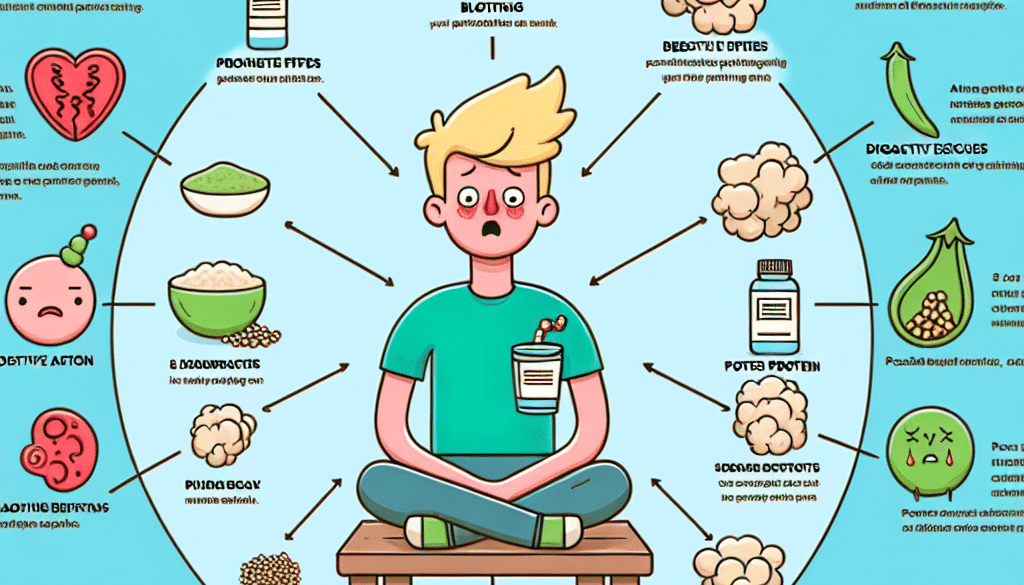Pea Protein Powder Side Effects: What to Know
-
Table of Contents
Pea Protein Powder Side Effects: What to Know

Pea protein powder has gained popularity in recent years as a plant-based alternative to traditional whey protein. It is derived from yellow peas and is known for its high protein content, making it a popular choice among vegans, vegetarians, and individuals with dairy allergies or sensitivities. While pea protein powder offers numerous health benefits, it is important to be aware of potential side effects. In this article, we will explore the possible side effects of pea protein powder and provide valuable insights to help you make an informed decision about its use.
1. Digestive Issues
One of the most common side effects of pea protein powder is digestive issues. Some individuals may experience bloating, gas, or stomach discomfort after consuming pea protein powder. This can be attributed to the high fiber content of peas, which can be difficult for some people to digest. Additionally, pea protein powder contains oligosaccharides, a type of carbohydrate that can cause gas and bloating in certain individuals.
To minimize digestive issues, it is recommended to start with a small serving size of pea protein powder and gradually increase the amount over time. Drinking plenty of water and consuming the powder with a meal can also help improve digestion.
2. Allergic Reactions
While pea protein powder is generally considered safe for most individuals, some people may have an allergic reaction to peas. Pea allergies are relatively rare but can cause symptoms such as itching, hives, swelling, and difficulty breathing. If you have a known allergy to peas or legumes, it is important to avoid pea protein powder and opt for an alternative protein source.
If you are unsure whether you have a pea allergy, it is recommended to consult with a healthcare professional or allergist before incorporating pea protein powder into your diet.
3. Heavy Metal Contamination
Another potential concern with pea protein powder is heavy metal contamination. Peas, like other plants, can absorb heavy metals from the soil in which they are grown. While reputable manufacturers conduct rigorous testing to ensure their products meet safety standards, there have been instances of pea protein powders being found to contain trace amounts of heavy metals such as lead, arsenic, and cadmium.
To minimize the risk of heavy metal contamination, it is important to choose pea protein powders from trusted brands that prioritize quality control and third-party testing. Look for products that are certified organic and have undergone independent testing for heavy metals.
4. Interference with Medications
Pea protein powder contains certain compounds that may interfere with the absorption of certain medications. For example, pea protein contains phytic acid, which can bind to minerals and reduce their bioavailability. This can potentially interfere with the absorption of medications that rely on these minerals for proper efficacy.
If you are taking any medications, it is advisable to consult with your healthcare provider before incorporating pea protein powder into your diet. They can provide guidance on potential interactions and help you determine whether pea protein powder is suitable for you.
5. Hormonal Effects
There have been concerns about the potential hormonal effects of pea protein powder, particularly in men. Pea protein contains compounds called phytoestrogens, which are plant-based compounds that mimic the effects of estrogen in the body. Some studies have suggested that high consumption of phytoestrogens may have feminizing effects in men, such as reduced testosterone levels.
However, the evidence regarding the hormonal effects of pea protein powder is limited and conflicting. More research is needed to fully understand the potential impact of pea protein on hormone levels. If you have concerns about hormonal effects, it is best to consult with a healthcare professional.
Summary
Pea protein powder is a popular plant-based protein alternative that offers numerous health benefits. However, it is important to be aware of potential side effects. Digestive issues, allergic reactions, heavy metal contamination, interference with medications, and hormonal effects are among the possible side effects of pea protein powder. To minimize the risk of side effects, it is recommended to start with a small serving size, choose trusted brands, and consult with a healthcare professional if you have any concerns.
About ETprotein
ETprotein is a reputable protein Chinese factory manufacturer and supplier, renowned for producing, stocking, exporting, and delivering the highest quality organic bulk vegan protein and plant proteins. Their offerings, characterized by a neutral taste and non-GMO, allergen-free attributes, cater to a diverse range of industries including nutraceutical, pharmaceutical, cosmeceutical, veterinary, as well as food and beverage finished product distributors, traders, and manufacturers.
ETprotein specializes in exporting and delivering tailor-made protein powder and finished nutritional supplements. Their extensive product range covers sectors like Food and Beverage, Sports Nutrition, Weight Management, Dietary Supplements, Health and Wellness Products, and Infant Formula, ensuring comprehensive solutions to meet all your protein needs.
As a trusted company by leading global food and beverage brands and Fortune 500 companies, ETprotein reinforces China’s reputation in the global arena. For more information or to sample their products, please contact them at sales(at)ETprotein.com today.














